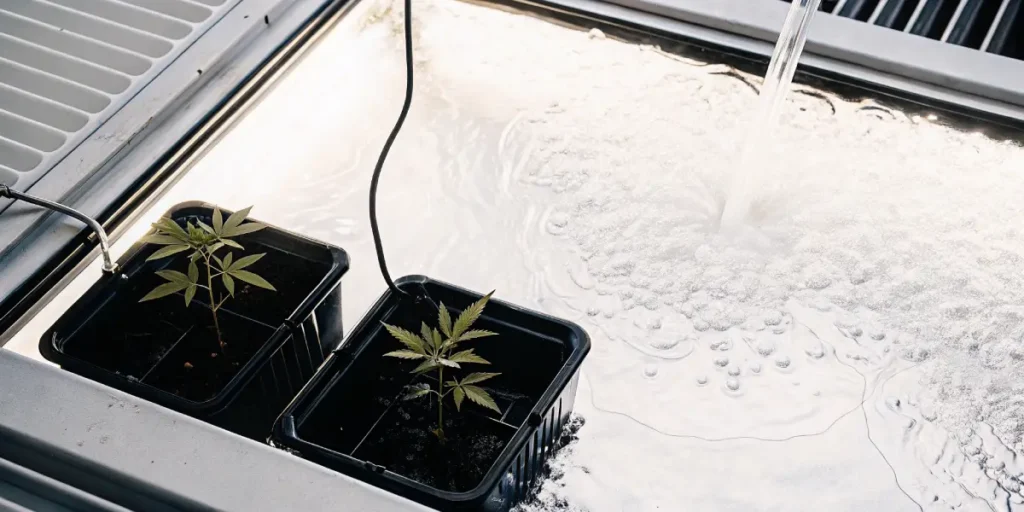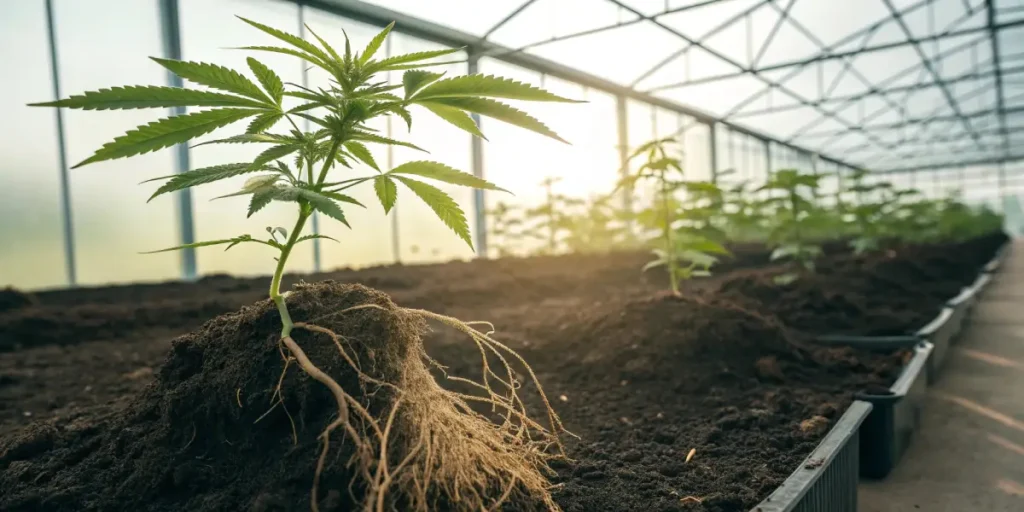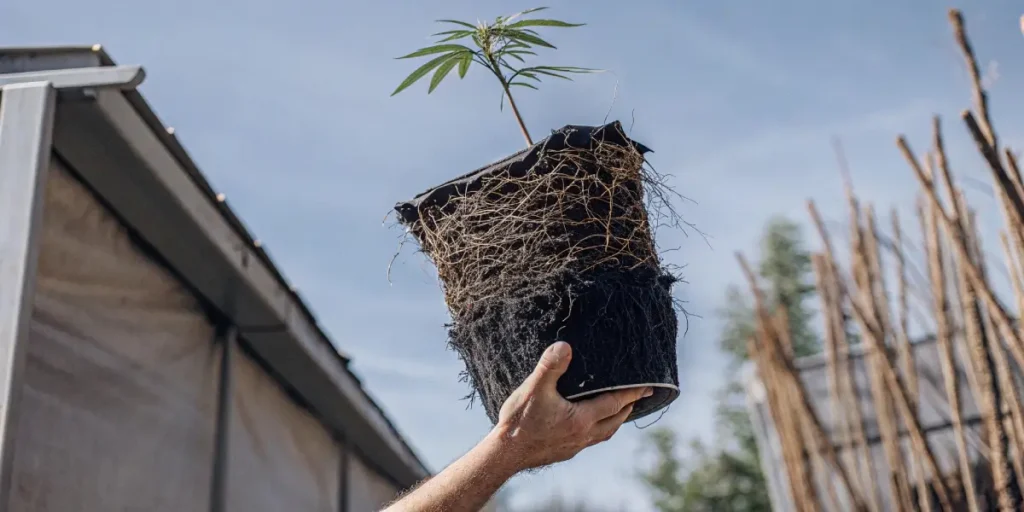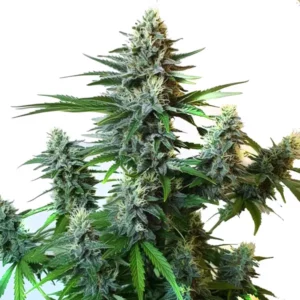
Cannabis Root Health Strategies
Healthy roots are the foundation of a thriving cannabis plant. They absorb water and nutrients, anchor the plant, and store valuable carbohydrates. Cultivators often overlook the root system, focusing instead on what’s above ground. However, a strong root system is vital for the plant’s overall health and productivity, which is why implementing effective cannabis root health strategies is essential for long-term success.
Building resilient roots starts with proper planning and care. Whether you are a first-time grower or a seasoned cultivator, adopting cannabis root health strategies will help ensure your plants grow strong and robust. By knowing the needs of your cannabis roots, you can prevent diseases and enhance growth.
Recommended Strains
Blue Cheese
-
THC: 16% - 20%
-
Type of seed: Feminized
-
Phenotype: 20% Sativa / 80% Indica
-
Flavor: Cheese, Fruity, Spicy, Sweet
-
Day to flower: 8 - 9 weeks
Blue Cheese Autoflower
-
THC: 14% - 16%
-
Type of seed: Autoflowering
-
Phenotype: 20% Sativa / 80% Indica
-
Flavor: Cheese, Fruity, Sweet
-
Life cycle of: 8 - 10 weeks
For example, growing strains like Blue Dream can benefit significantly from targeted root care. This strain is known for its resilience but still requires the right environment to thrive. Proper root care can make all the difference in achieving a bountiful harvest.
Cannabis Root Disease Prevention Techniques
Root diseases can severely impact cannabis plants, leading to stunted growth and poor yields. Prevention is the best strategy. Start by ensuring your grow environment is clean and free from pathogens. A sterile environment discourages the development of diseases that can attack the roots.
Using well-draining soil is another key technique. Overwatering is a common mistake that causes root rot, a disease that can devastate your plants. Choose a soil mix that provides excellent drainage, allowing excess water to escape while retaining necessary moisture.
Regular inspection of your root system can also aid in cannabis root disease prevention techniques. By closely monitoring the roots for any signs of discoloration or unusual texture, problems can be addressed before they escalate. Early intervention is crucial in maintaining a healthy root system.
Furthermore, rotating your crops and using disease-resistant strains can significantly reduce the risk of root-related diseases. These practices ensure that pathogens have fewer opportunities to take hold, thereby supporting overall cannabis root health strategies.
Organic Methods for Healthy Cannabis Roots
Organic methods are a sustainable way to promote healthy roots. One effective approach is using compost teas, which are rich in beneficial microbes. These microbes enhance nutrient uptake and protect roots from harmful pathogens. Regular application of compost tea can lead to healthier, more resilient plants.
Mulching is another organic technique to improve root health. Mulch helps retain soil moisture, regulates temperature, and adds organic matter to the soil as it breaks down. This creates a healthy environment for roots to thrive and grow robustly.
Another organic method involves the use of biochar, a carbon-rich material that enhances the soil’s nutrient-holding capacity. By incorporating biochar into your soil mix, you can further support organic methods for healthy cannabis roots.
Cover cropping is also an effective organic strategy. By growing cover crops alongside cannabis, you can improve soil structure and increase the biodiversity of beneficial microorganisms, further enhancing cannabis root health strategies.
Promos & Deals
Improving Cannabis Root System Resilience
Building a resilient root system involves more than just prevention. Introducing beneficial fungi, such as mycorrhizae, can strengthen roots. These fungi form a symbiotic relationship with the plant, extending the root system and improving nutrient absorption.
Another strategy is maintaining optimal soil pH. Cannabis roots prefer a slightly acidic environment, typically between 6.0 and 7.0. Regularly test your soil’s pH and adjust as needed to keep it within the ideal range. This ensures that nutrients are readily available for uptake by the roots.
Implementing crop rotation is another effective strategy to support a resilient root system. By rotating different plant species, you can disrupt the lifecycle of soil-borne pathogens, thereby improving cannabis root system resilience.
Incorporating organic matter, like compost, into your soil also boosts resilience. This practice enhances soil structure, increases water retention, and provides a steady supply of nutrients, contributing to robust cannabis root health strategies.

Cannabis Root Health Monitoring Tools
Monitoring tools can help you keep track of your root health. Soil moisture meters are invaluable for avoiding overwatering, a common cause of root problems. These tools provide real-time data, allowing you to water only when necessary.
Soil pH meters are another essential tool. By regularly checking the pH level, you can make informed decisions about nutrient applications and prevent potential nutrient lockouts. Consistent monitoring ensures that your roots have access to the right conditions for growth.
Electronic nutrient meters are also valuable cannabis root health monitoring tools. These devices help you track the levels of essential nutrients, ensuring that your plants receive a balanced diet for optimal root growth.
Additionally, root cameras or endoscopes can provide a visual inspection of the root system without disturbing the soil. This technology allows for a detailed analysis of root health, aiding in the implementation of effective cannabis root health strategies.
Effective Nutrients for Cannabis Root Health
Nutrient management is critical for healthy roots. A balanced diet ensures robust growth and disease resistance. Essential nutrients include nitrogen, phosphorus, and potassium, along with trace elements like calcium, magnesium, and iron.
Root-specific nutrients, such as root stimulators and growth enhancers, can also be beneficial. These products promote root development and improve nutrient uptake, leading to healthier plants. Choose products that are proven to support root growth and apply them according to the manufacturer’s recommendations.
Utilizing natural amendments like worm castings can also enhance nutrient availability. These amendments enrich the soil with organic matter and beneficial microbes, supporting effective nutrients for cannabis root health.
Incorporating fish emulsion as a fertilizer provides an additional nutrient boost. Rich in essential elements, fish emulsion is known to promote vigorous root growth and enhance overall plant vitality, aligning with comprehensive cannabis root health strategies.

FAQs About cannabis root health strategies
What are the signs of unhealthy cannabis roots?
Unhealthy roots often exhibit signs that are visible above ground. Yellowing or wilting leaves can indicate root problems. This can result from nutrient deficiencies, root rot, or overwatering. If you notice these symptoms, check your root system immediately.
Another sign of root issues is stunted growth. If your plants are not growing as expected, it could be due to poor root health. Inspect the roots for any signs of disease or damage, and take corrective action to restore their health.
Besides to visual symptoms, a foul odor emanating from the root zone can also indicate unhealthy roots. This smell often suggests rot or decay, necessitating immediate attention to the root system.
Furthermore, a lack of new root growth or brittle roots can signify underlying health issues. Regularly evaluate the root system as part of your cannabis root health strategies to ensure any problems are addressed promptly.
How can I prevent root rot in my cannabis plants?
Preventing root rot starts with proper watering practices. Ensure that your soil has good drainage, and avoid overwatering. Use containers with drainage holes and a well-aerated growing medium to allow excess water to escape.
Additionally, maintain a clean growing environment to prevent the spread of pathogens. Regularly sanitize your tools and equipment, and avoid introducing contaminated materials into your grow space. These practices will help keep root rot at bay.
Using beneficial microbes, such as Trichoderma, can also aid in preventing root rot. These microbes outcompete harmful pathogens, providing a natural defense for your roots.
Consistently monitoring soil moisture levels with cannabis root health monitoring tools can prevent overwatering, a primary cause of root rot. Keeping the soil appropriately moist is essential for avoiding this detrimental condition.
Are there organic alternatives to chemical root stimulators?
Yes, there are several organic alternatives to chemical root stimulators. Compost tea is an excellent option, providing a natural source of beneficial microbes that encourage root growth. Regular applications can enhance root health without the need for synthetic chemicals.
Another organic alternative is using seaweed extracts. Rich in natural growth hormones, seaweed promotes root development and plant vitality. It can be applied as a foliar spray or soil drench, offering a versatile solution for organic growers.
Aloe vera juice is another organic option that can be used as a root stimulant. Known for its health benefits, aloe vera provides enzymes and nutrients that support vigorous root growth.
Additionally, humic and fulvic acids are organic compounds that enhance nutrient absorption and stimulate root development, serving as effective organic methods for healthy cannabis roots.
What role do beneficial fungi play in root health?
Beneficial fungi, such as mycorrhizae, play a crucial role in root health. They form symbiotic relationships with plant roots, extending the root system and improving nutrient and water uptake. This enhances the plant’s ability to access essential resources.
By incorporating mycorrhizae into your growing medium, you can improve root resilience and overall plant health. These fungi also help protect roots from pathogens, reducing the risk of diseases like root rot. This makes them a valuable tool in cannabis root health strategies.
Beyond nutrient uptake, beneficial fungi also improve soil structure by creating a network of filaments that stabilize the soil, further supporting cannabis root health strategies.
Furthermore, these fungi can increase drought resistance by enhancing water retention and availability, making them indispensable in improving cannabis root system resilience.
Why is soil pH important for cannabis root health?
Soil pH is important because it affects nutrient availability. Cannabis roots absorb nutrients most efficiently within a specific pH range. If the pH is too high or too low, it can lead to nutrient lockout, where essential elements become unavailable to the plant.
Maintaining the correct soil pH ensures that your plants receive the nutrients they need for optimal growth. Regularly test and adjust the pH of your growing medium to keep it within the ideal range, promoting healthy root development and robust plants.
Besides to nutrient availability, proper soil pH also influences microbial activity. A balanced pH supports a thriving community of beneficial microbes, which are essential for organic methods for healthy cannabis roots.
Using buffering agents like lime or sulfur can help adjust and stabilize soil pH levels, ensuring that your cannabis root health strategies continue to support optimal growth conditions.



















